The Best Herbal Tea Recipe for Nausea Relief
Nausea can be a real drag, right? I actually get that nauseated, woozy feeling fairly often. Whether you’re dealing with morning sickness during pregnancy, motion sickness during travel, or just an upset stomach from indigestion, it’s not a fun feeling. In this post, I’m going to share the best herbal tea recipe for nausea relief that can help soothe your stomach and alleviate those icky feelings. The good news? Using the power of herbs like peppermint, ginger, nettle, chamomile, and orange peel, this tea will soothe the tummy troubles and icky feelings that come along with nausea.

Nausea is a feeling of unease or discomfort in the stomach that may be accompanied by a sensation of queasiness, the urge to vomit, or actual vomiting.
Causes of Nausea
- Digestive issues: Nausea is a common symptom of digestive system issues such as acid reflux, gastritis, and irritable bowel syndrome (IBS).
- Motion sickness: Nausea can be triggered by motion sickness, such as during car or boat rides.
- Viral infections: Nausea can be a symptom of viral infections such as the flu or stomach flu.
- Medications: Certain medications, such as chemotherapy drugs, antibiotics, and painkillers, can cause nausea as a side effect.
- Pregnancy: Morning sickness is a common symptom of pregnancy and can cause feelings of nausea.
- Stress and anxiety: Nausea can be a physical manifestation of stress and anxiety.
- Dehydration: Dehydration can cause feelings of nausea and vomiting.
- Food poisoning: Nausea is a common symptom of food poisoning, which can be caused by eating contaminated food.
- Migraine headaches: Some people experience nausea as a symptom of migraine headaches.
If you suspect one of these issues, you should look at herbs with health benefits that best support your condition.
Medical disclaimer: I am not a medical professional and I am not claiming that these herbs are a substitute for professional care. Always consult a professional for medical advice when starting natural remedies at home. These are just things that I use and love in my own home.
The Best Herbal Tea Recipe for Nausea
My favorite place to buy herbs online is Starwest Botanicals. Each of the links below is an affiliate link, where I make a small commission from your purchase, at no additional cost to you.
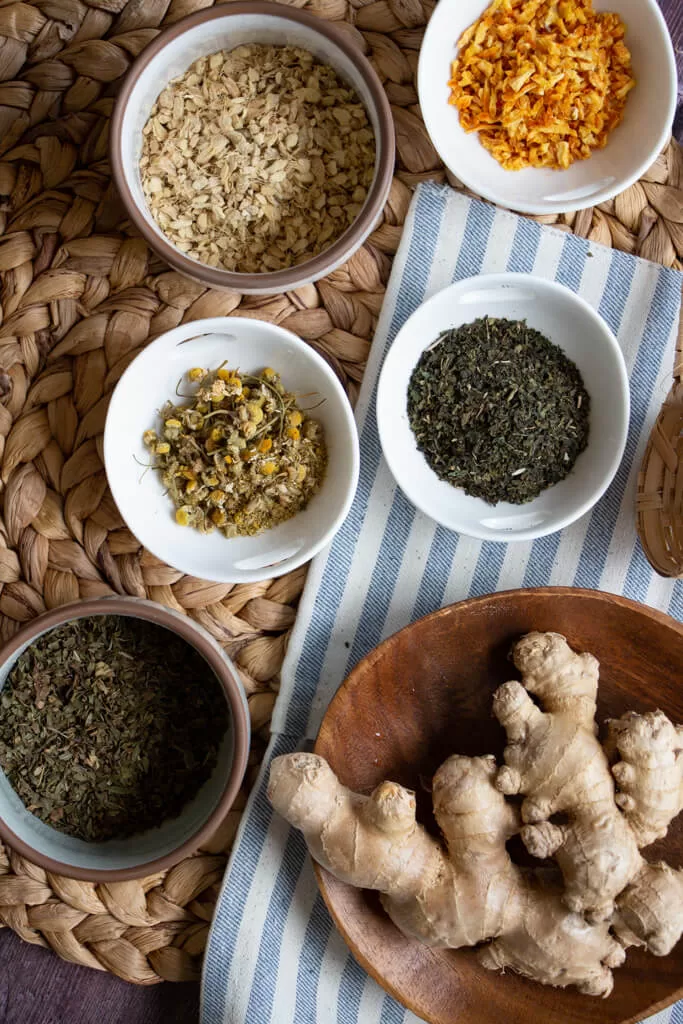
Ingredients:

Don’t have all these herbs? That is okay! Something as simple as peppermint tea or ginger tea can work wonders on their own!
Optional additions or substitutions: marshmallow root (coats the stomach lining after vomiting), lemon balm (calms stomach upsets), honey, lemon
As an Amazon Associate, I earn from qualifying purchases. Please visit my privacy + disclosure page for more details.
Supplies:
How to Brew Herbal Tea
For detailed instructions on the methods for brewing herbal tea, check out my post: How to Brew Herbal Tea: Infusions and Decoctions.
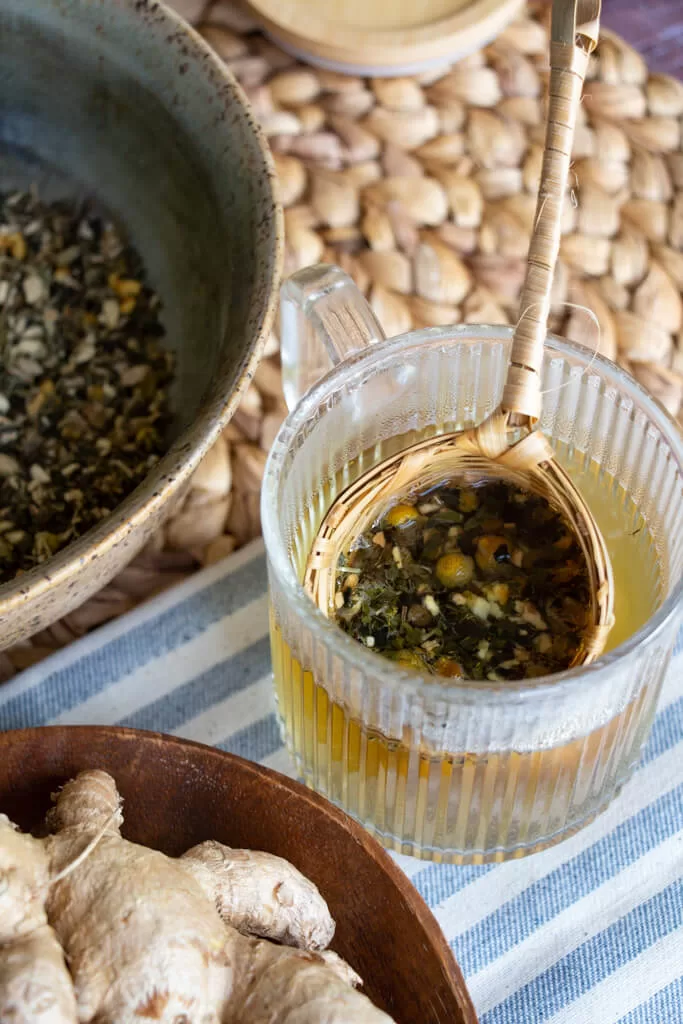
How to Brew Herbal Tea for Nausea:
- In a mixing bowl, combine all the dried herbs and stir to mix well. Store in your half-pint jar.
- Measure out 2 tablespoons of the herbal tea blend and place it in a tea strainer or infuser.
- Bring 1.5 cups of water to a boil. Always use hot water that has been brought to a boil and then allowed to cool slightly. This ensures that the tea is brewed properly and the flavors and properties of the herbs are extracted. Water that is too hot can damage the delicate compounds in the herbs, and water that is too cool may not extract all of the beneficial properties.
- Place the tea strainer or infuser in a mug and pour the hot water over it.
- Allow the tea to steep for 5-7 minutes. Always cover your mug when steeping to maintain all the herbal benefits.
- Remove the tea strainer or infuser from the mug and discard or compost the used herbs.
- You can add honey or lemon juice if you like.
- Enjoy your herbal nausea tea hot. The steam and scent of the hot tea will add to the healing effect.

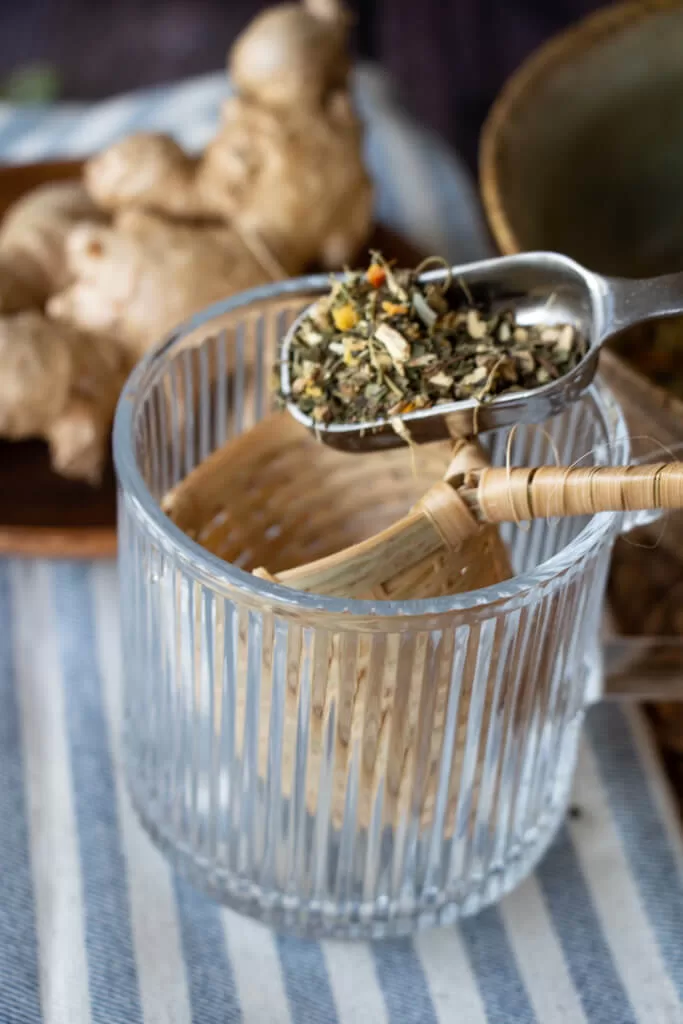
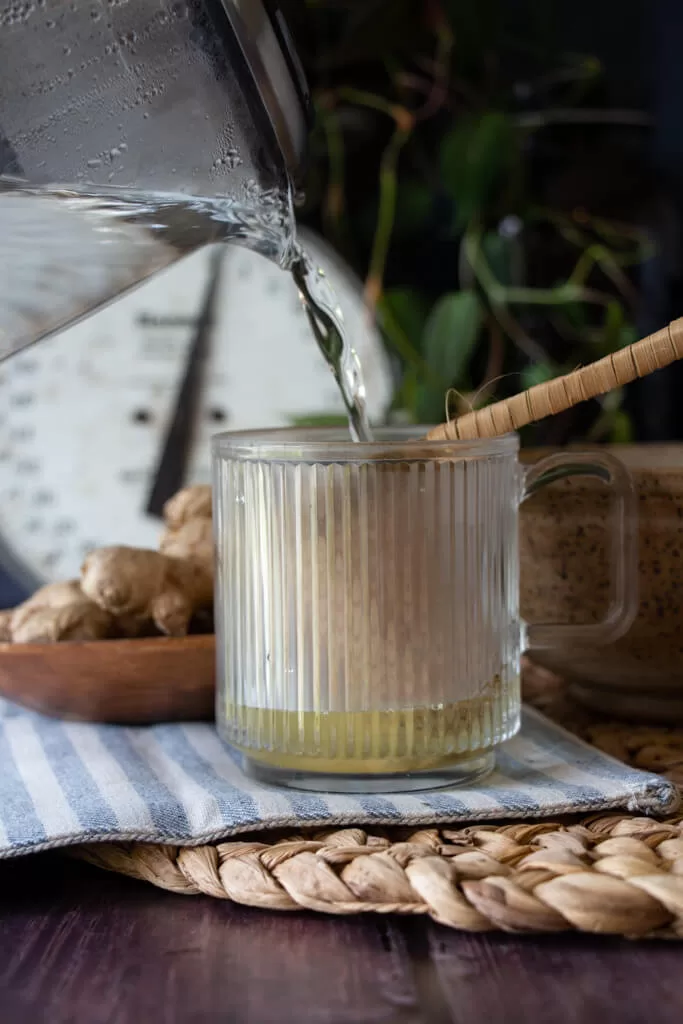
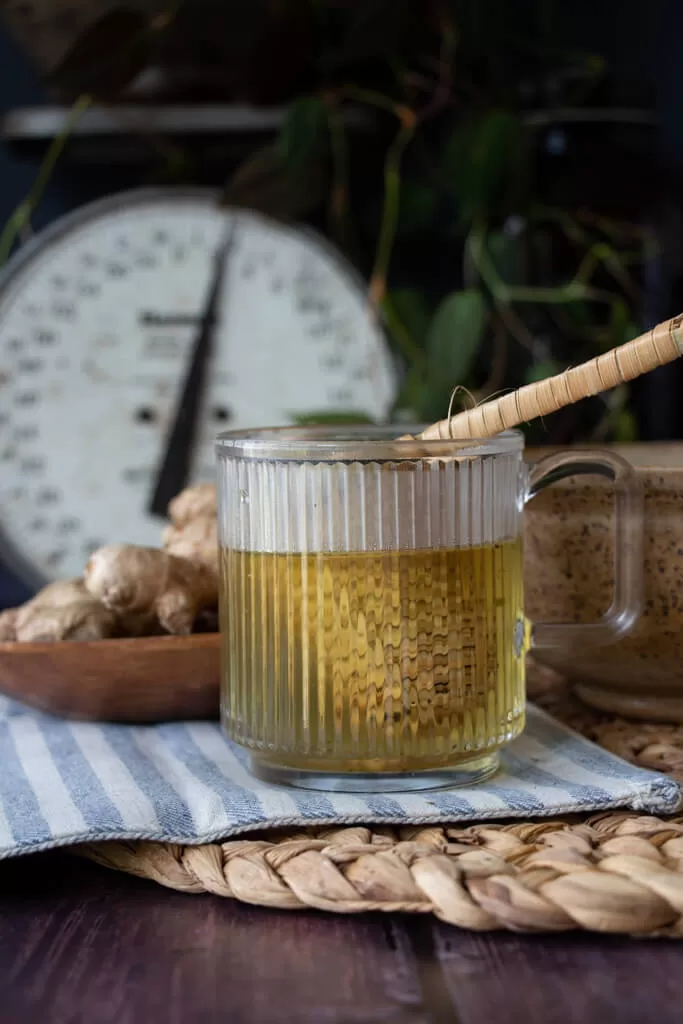
To Use:
- Amount: It’s generally recommended to consume 1-2 cups of this herbal tea per day for nausea relief. However, it’s important to note that consuming large amounts of certain herbs, like peppermint or ginger, may cause side effects like heartburn or upset stomach.
- Timing: This tea can be consumed at any time of day when you are experiencing nausea. However, it may be particularly helpful to drink it before meals or at the onset of nausea symptoms. It’s also important to note that if you are pregnant, you should consult with your healthcare provider before consuming this tea.
As with any herbal remedy, the best approach is to start with a small amount and see how your body reacts before consuming larger amounts. Additionally, if your nausea symptoms persist or worsen, it’s important to consult with a healthcare professional to rule out any underlying medical conditions.
For detailed information on child dosage, check out this post on safe and effective herbs for kids.
Caffeine content: This herbal tea blend does not contain any caffeine, which makes it a great option for individuals who are sensitive to caffeine or who are looking for a caffeine-free alternative to traditional teas.
Storage
The tea blend can be stored in an airtight container in a cool, dry place for up to six months to maintain maximum freshness. It is important to store the tea away from direct sunlight, as exposure to light can cause the herbs to lose their potency.

Herbal Benefits for Nausea Tea
PepperminT
Peppermint is known for its anti-nausea properties. It can help relax the digestive muscles, which can alleviate symptoms of nausea and vomiting.
ginger
Ginger has anti-inflammatory properties and can speed up the movement of food through the stomach, which can help alleviate symptoms of nausea. It can also neutralize stomach acid.
Nettle
Nettle is a natural diuretic that can help flush out toxins from the body. It can also help soothe an upset stomach and reduce inflammation in the digestive tract. Nettle contains iron and vitamin C, which definitely help me when I feel a bit woozy and nauseated.
Chamomile
Chamomile is a natural sedative that can help calm the nerves and reduce stress, which can alleviate symptoms of nausea. It can also help ease digestive problems and improve digestion.
Orange Peel
Orange peel contains compounds that can help stimulate digestion and reduce inflammation in the digestive tract. It can also add a pleasant citrus flavor to the tea.
These herbs have been used for centuries in traditional medicine. Combining these herbs together can help create a powerful herbal tea that can soothe an upset stomach, reduce inflammation in the digestive tract, and alleviate symptoms of nausea.
While herbs are a gentle way to ease your symptoms and heal the body, they may still have side effects (though, far fewer side effects than over-the-counter medications to treat allergies). Herbal medicine is MEDICINE and should always be treated as such.
This herbal tea for nausea provides a minty comfort that is the perfect natural remedy for soothing an upset stomach. It’s a great option to turn to when you’re feeling queasy, whether it’s from morning sickness, motion sickness, or other causes. The blend of peppermint, ginger, nettle, chamomile, and a twist of orange creates a perfect tea that not only helps with nausea but also provides a delicious flavor. So, next time you’re feeling those icky feelings of nausea, reach for a hot cup of herbal tea and let its natural properties do their work.
If you make the tea, snap a pic and tag me on Instagram!
Healing Herbal Teas with The Homestead Challenge
This post is part of a series about herbal tea blends for common ailments. Check out the posts below with the best herbal teas for each condition!
- How to Brew Herbal Tea: Infusions and Decoctions
- Cold and Flu Tea
- Allergy Tea
- Marshmallow Root Tea
- Anxiety Tea
- Energy Tea
- Headache Tea
- Hangover Tea
- Mugwort Tea
Pin Herbal Tea Recipe for Nausea for Later!


About the Author:
I’m Brittany, totally modern and mainstream turned crunchy mama!
Read more here about how I went from a totally incompetent cook and hyper-consumer to striving to live a more meaningful life from scratch.
I can’t wait to share my modern homesteading journey with you and I hope I inspire you to join along!


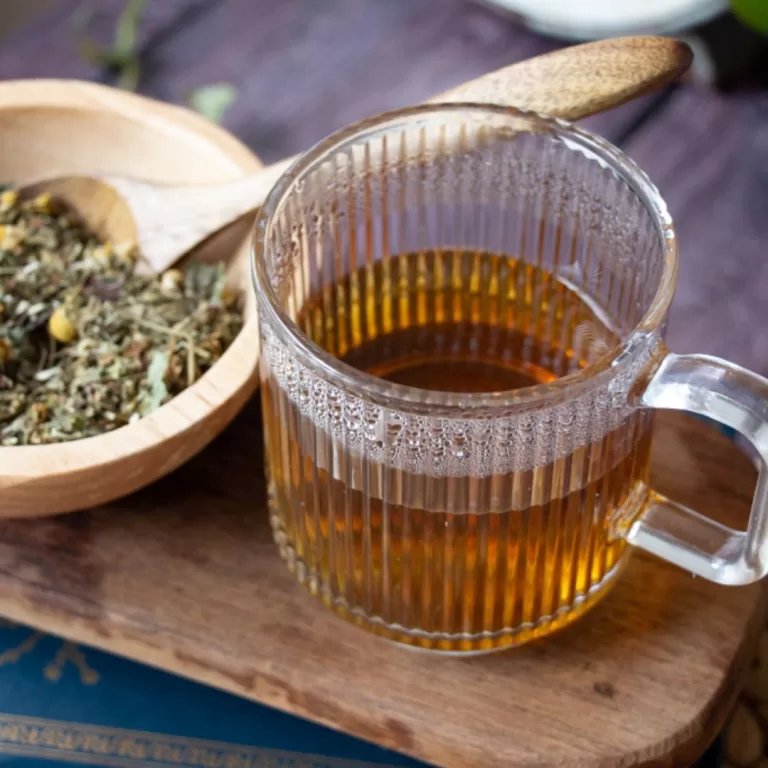

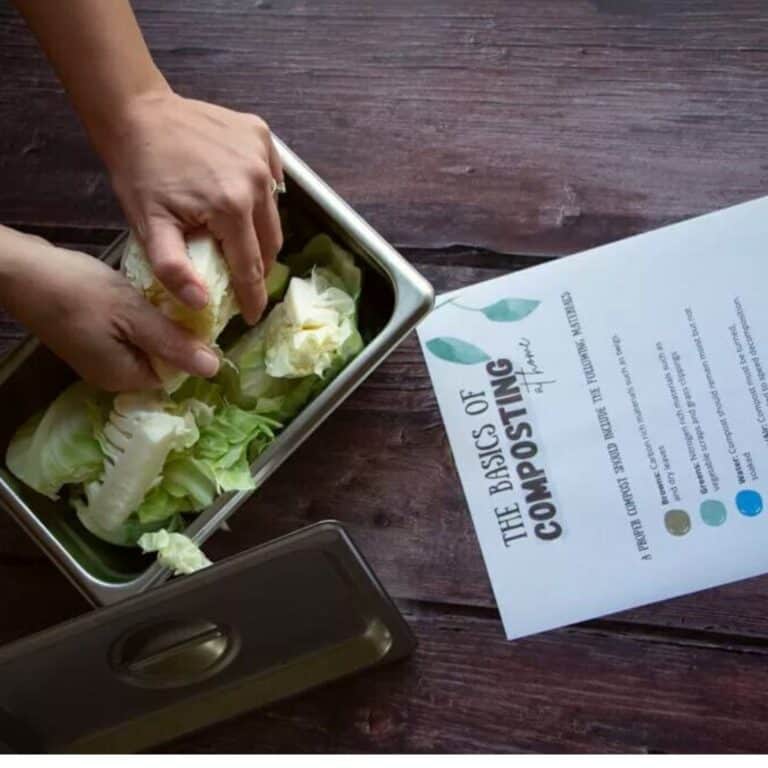


Where do you get the wooden strainer that is pictured here? I would love to know.
Amazon! https://amzn.to/3GjMnXC (affiliate link)
I love making herbal teas to treat ailments because they are delicious and effective. But I’m going to try try your tea blend just because it seems like it would be delicious and not necessarily for nausea!
I really want to start making my own homemade teas. Thanks so much for sharing this looks great!
It is so easy! But also easy to get addicted to buying all the herbs! haha